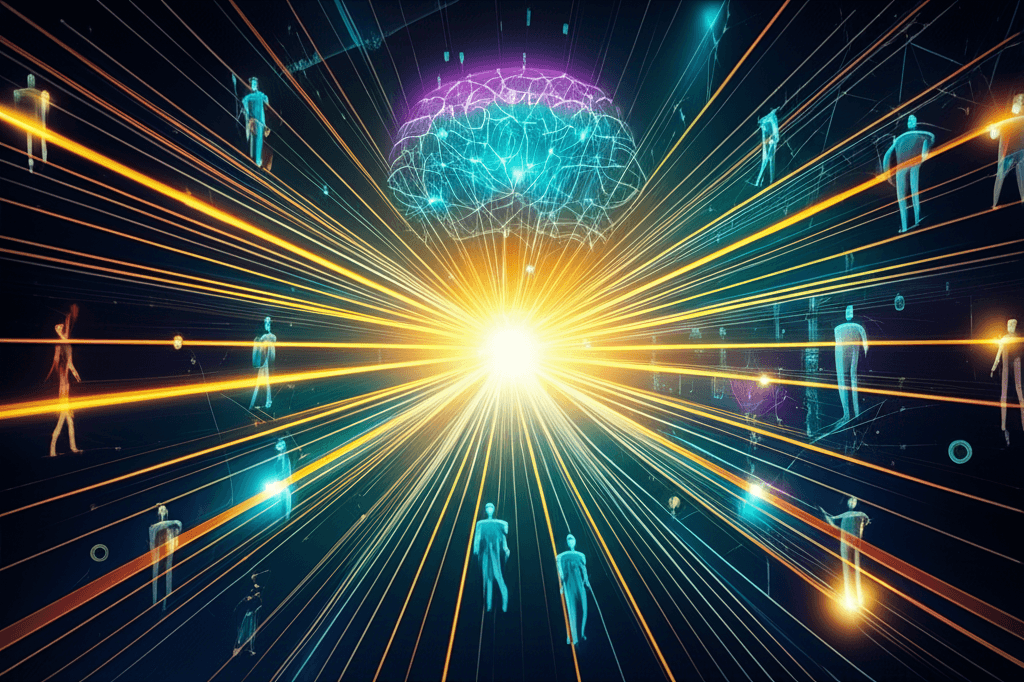Meta Leads AI Talent War, Offering Unprecedented Pay for AGI Pursuit
Meta weaponizes unprecedented wealth and computing power to poach elite AI talent, aiming to win the race to AGI.
July 10, 2025

A fierce battle for the brightest minds in artificial intelligence is escalating across the tech industry, with Meta Platforms at the forefront, wielding staggering compensation packages to build an AI powerhouse. The social media giant's aggressive recruitment strategy was recently highlighted by its hiring of Ruoming Pang, the lead engineer and manager of Apple's Foundation Models team.[1] Pang's move to Meta was reportedly secured with a compensation package worth over $200 million spread over several years, a figure that far exceeded what Apple was willing to match and is in line with offers made to other top-tier researchers joining Meta's ambitious new "superintelligence" group.[2][3] This high-stakes talent acquisition underscores a broader, industry-wide war for a very limited pool of elite AI experts, a conflict that is reshaping research labs and corporate strategies from Silicon Valley to Zurich.
Meta's strategy, personally driven by CEO Mark Zuckerberg, involves not just lucrative pay but a clear, singular mission: to be the first to achieve artificial general intelligence (AGI), or AI that can reason, learn, and function at or above human-level capabilities.[4][5][6] To this end, the company has established a new division, Meta Superintelligence Labs, and is actively poaching top talent from competitors like OpenAI, Google DeepMind, Anthropic, and now Apple.[7][6][8] Zuckerberg has been personally involved in the recruitment process, meeting with candidates and extending offers that go beyond typical executive pay scales.[9][8] The compensation packages are heavily weighted with Meta stock, often with vesting schedules tied to performance targets and tenure, designed to retain these valuable minds for the long haul.[2][10][11] The recent hires include not only Pang but also former GitHub CEO Nat Friedman and AI startup founder Daniel Gross, who now co-lead the superintelligence unit.[2][12] Meta also secured Alexandr Wang as its Chief AI Officer through a massive $14.3 billion investment for a 49% stake in his data-labeling firm, Scale AI.[2][10]
The talent drain is having a palpable impact on the companies being poached from. Pang's departure from Apple is seen as a significant blow to the iPhone maker's own AI ambitions.[1] He led a team of around 100 engineers responsible for developing the foundational large language models that power Apple Intelligence, the company's recently unveiled suite of AI features.[9][8] His exit raises questions about the internal momentum of Apple's AI development, which some critics already view as lagging behind competitors like OpenAI and Meta.[5][6] For its part, Apple did not attempt to match Meta's offer for Pang, which reportedly surpasses the compensation of all its executives except for CEO Tim Cook.[2][10][3] This highlights the extreme financial lengths Meta is willing to go to, creating a market for talent that few other companies can compete in. The effects are also felt at dedicated AI labs; OpenAI's CEO Sam Altman has publicly commented on Meta's attempts to lure his researchers with signing bonuses that have been rumored to reach $100 million, a claim Meta's CTO has downplayed as exaggerated.[4][3][13]
Underpinning Meta's aggressive hiring is an equally ambitious investment in the raw materials of AI development: computing power. The company has announced plans to invest up to $65 billion in AI infrastructure in 2025 alone.[14][15][16][17] This massive expenditure is earmarked for building new data centers, including one facility described as being large enough to cover a significant portion of Manhattan, and acquiring a vast arsenal of specialized graphics processing units (GPUs).[15][16][17][18] By the end of 2025, Meta aims to possess over 1.3 million GPUs, giving its researchers unparalleled computational resources to train and run increasingly complex AI models.[15][17] This combination of elite talent, led by AI pioneers like Turing Award winner Yann LeCun who has long been Meta's Chief AI Scientist, and immense computing power is central to Zuckerberg's strategy.[19][20][21] LeCun's vision extends beyond the current hype around large language models, focusing on building systems with a deeper understanding of the physical world, reasoning, and persistent memory—all critical steps on the path to AGI.[22][23]
In conclusion, Meta's multi-pronged strategy of offering unprecedented compensation, pursuing a clear and ambitious goal of AGI, and building a world-class infrastructure is profoundly impacting the AI landscape. The company is betting that concentrating the world's top AI talent and providing them with nearly limitless resources will allow it to leapfrog the competition.[24] This aggressive approach is creating a super-team of researchers and engineers pulled from the highest echelons of the tech world.[5][25] The resulting "talent war" is not just inflating salaries but is also forcing a strategic realignment across the industry, as competitors are forced to decide whether they can—or even want to—compete on Meta's extravagant terms.[26][27] The long-term success of this high-risk, high-reward gamble is yet to be determined, but its immediate effect is clear: Meta has forcefully positioned itself at the center of the race to build the future of intelligence.
Sources
[3]
[5]
[7]
[10]
[11]
[13]
[15]
[16]
[17]
[18]
[19]
[20]
[21]
[22]
[24]
[25]
[26]
[27]